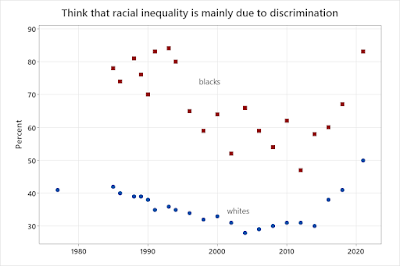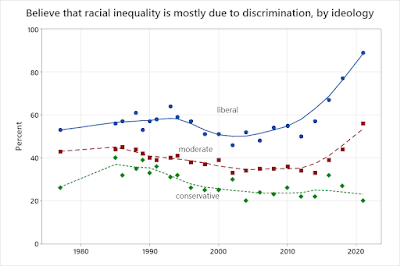There have been numerous efforts to define "woke" in the past week or two. A common problem with the ones I've seen is that they have been too elaborate, treating it as if it were a political ideology rather than general current of opinion. I would define it as an inclination to think that discrimination is the primary cause of group inequalities (except when a generally favored group is on the bad side, as with men being overrepresented in prison).
With this definition, we have a question that can be used to measure the growth of "wokeness." The General Social Survey asks: "On the average (negroes/blacks/African-Americans) have worse jobs, income, and housing than white people. Do you think these differences are mainly due to discrimination?"
Agreement was generally declining among both whites and blacks until about 2014. but there have been large increases in 2016, 2018, and 2021. White agreement is at its highest level ever, and black agreement is almost equal to its highest level. Of course, opinions are affected by experience and other evidence, but those haven't changed dramatically in the last ten years---that leaves what I called the "inclination." Ibram X. Kendi's remarks are interesting in this context: "The racist answer is 'no'—it presumes that racist discrimination no longer exists and that racial inequities are the result of something being wrong with Black people. The anti-racist answer is 'yes'—it presumes that nothing is wrong or right, inferior or superior, about any racial group, so the explanation for racial disparities must be discrimination." That is, he doesn't appeal to evidence, but to principle: "presumes" and "must be."
The GSS asks people to rate their ideology on a seven-point scale: I divided it into three groups, very and somewhat liberal; slightly liberal, moderate and slightly conservative; and somewhat and very conservative. Liberals and moderates have both moved substantially towards agreement, but there has been little change among conservatives. There's a good deal of sampling error in year-to-year changes in subgroups, but agreement rose among conservatives between 2014 and 2016, but then declined in 2018 and 2021.



From Wikipedia:
ReplyDelete"The phrase stay woke had emerged in AAVE by the 1930s, in some contexts referring to an awareness of the social and political issues affecting African Americans. The phrase was uttered in a recording by Lead Belly and later by Erykah Badu. During the 2014 Ferguson protests, the phrase was popularized by Black Lives Matter (BLM) activists seeking to raise awareness about police shootings of African Americans. After seeing use on Black Twitter, the term woke became an Internet meme and was increasingly used by white people, often to signal their support for BLM, which some commentators have criticised as cultural appropriation. Mainly associated with the millennial generation, the term spread internationally and was added to the Oxford English Dictionary in 2017."
"Mainly associated with the millennial generation"
So is there an age split in the view of the term?
A few years back an acquaintance chastised me using the term "woke," the way I did alluding to the "cultural appropriation" indicated above.
But I don't think this definition covers the way the term is used today, because today the term also refers to support for policies that are - at best - controversial solutions to discrimination against various groups. I know people working in public schools in a district that I would consider highly "woke", and the policies that have been implemented regarding trans kids are viewed by many district employees as outrageous, and the same goes for purported "structural racism".
So I think it's important to bear in mind that while most people might be inclined to accept the general idea that there is discrimination against (racial, gender, preference) minority groups, some of the claims made by those groups and the policies that have been implemented - often very quietly - are quite astounding and probably not widely accepted, so in that sense "racism" isn't a proxy for "woke", which is now a term that implies something far greater than the general idea that racism occurs.
Also, I very strongly doubt that the actual incidence of "racism" follows a curve anything like the plots you have here. It's probably mostly a long term downtrend - although there may have been an uptick in incidents during the Trump presidency. A large part of what is visible here is the media trumpeting racism to rally opposition to Trump.
ReplyDelete